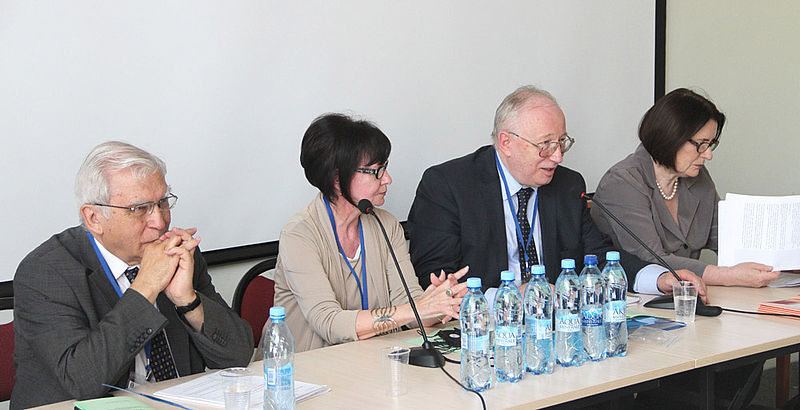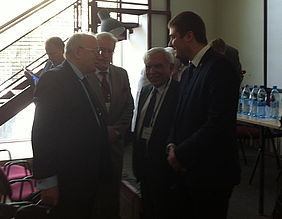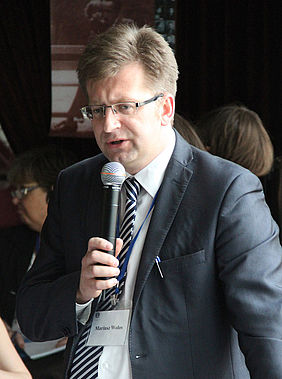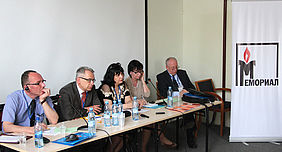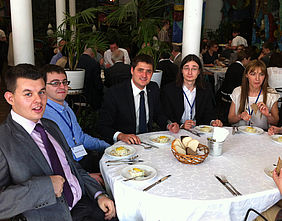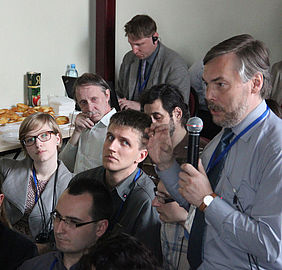The main topics during particular sessions were:
- "What is „historical policy? A perspective of a scientist, statesman, journalist and a citizen,”
- “The comparison between historical policy in Russia and in Poland: aims, means and results.”
- “Historical policy in Poland and Russia: decision making processes and the social perception.”
- “Main issues of the historical policy: comparison of Russia and Poland.”
- “Archives, research and education.”
- “What questions concerning historical policy arise main doubts of young people in the Eastern Europe?.”
We present below a report of Marcin Barański – a participant of the conference:
There is no doubt that the general subject of the Moscow debates - Politics of History: Russian and Polish versions - is of crucial importance in understanding and shaping our bilateral relations nowadays. Some problems and questions that arise in this context have been already singalized during open seminars and debates in Warsaw as well as during the St. Petersburg conference in October 2012, decicated to different values, memories and identities in Poland and Russia. The focus on the intersection of politics and history was therefore a natural continuation of our previous meetings within the framework of Academia in Public Discourse program. Given its highly-qualified participants, possibility of intensive, open and sincere discussion and - last but not least - unique atmosphere of community and cooperation, it was an honor and pleasure for me to take part in the Moscow conference as member of my University's delegation.
The conference started with the discussion on the very meaning of the term "politics of history", which is commonly used but often seems to be controversial. That is why speakers coming from various professional backgrounds and therefore representing different perspectives were gathered at the panel and asked to share their thoughts and experience on this point. The discussion was opened by Mr. Adam Daniel Rotfeld who - not for the first time - firmly insisted on the division between politics and history. According to Rotfeld, this are two very different things and tangling them leads inevitably to the instrumentalization of history. Historical truth may be inconvenient but is necessary for dialogue and reconciliation and therefore must not be replaced by so called politics of history. But what Rotfeld admitted, securing a nation's memory is constructive and silence over the past will not be helpful just as concealing being ill will not bring one back to health.
This strong assertion coming from an academic professor, diplomat and co-chairman of the Polish-Russian Group for Difficult Matters became the point of refererence for next speakers. Ms. Irina Shcherbakova of Memorial society continued with the importance of historical truth in shaping civil society in Russia. She reminded the Nineteen Eighty-Four hero Winston Smith searching for unbiased information about his country's past as well as shocking books by Aleksandr Solzhenitsyn that revealed the totalitarian nature and practice of the Soviet communist regime. Its collapse brought a bill on rehabilitation of the victimes and - to some extent - acces to state files, especially those concerning Katyn massacre. Unfortunately, in the years that followed, the will and interest of the state in reviewing its past has significantly diminished, partly because of the fear that such an examination will lead to defamation of the Russian nation. According to Shcherbakova, rehabilitation and commemoration of the victimes as well as broadening and making easier the acces to archives are a precondition for genuine freedom and justice that Memorial society is striving for.
Mr. Sławomir Dębski, director of the The Centre for Polish-Russian Dialogue and Understanding and professor of history as well returned to the crucial relation between history and state. As director of governmental body which is de facto doing politics of history, he defined it as a part of the state activity focused on the past. Such politics is being realised among others by stimulating historical research in the areas or topics that the government finds important to be examined and popularised. Politics of history is therefore closely linked to politics of memory. Partly responding to Rotfeld's remarks, Dębski insisted on securing the freedom of historical research, including both state-initiated projects as well as possible criticism and responses to them. In such a way politics of history is not led and controlled exclusively by the government, but is influenced by a number of various organisations or individuals, that is by an active civil society.
This observation was developed by Ms. Tatyana Filippova who asked the question on who is actually doing politics of history: state or society as a whole? Then, she concentrated her speech on what she had called the "historization of politics". The most prominent exemple of this process is the inauguration of Vladimir Putin's third presidency which, according to Filippova, invoked directly the Byzantine as well as Romanov legacy. Another exemples are recently established state holidays, notably the National Unity Day refering to the end of the Time of Troubles in 1612. These remarks were followed by a question from Professor Irina Savielieva who asked not only about the authors, but also about carriers and recipients of such politics of history. Another perspective was therefore introduced in the agenda. In his closing remark, Mr. Alexey Vasilyev claimed that Russian academic community has less influence on public discourse than the Polish one enjoys. He also announced the problem of the laws on memory (i.e. banning certain kinds of statements about the past) as well as of freedom of research.
It was obvious that the above-mentioned problems and questions would return in subsequent panels. What remained the core issue during the whole conference was the tension between the needs and challenges concerning the past to be faced by the state as well as by the society on the one hand and the risk of falsifying history on the other hand. Should the state completely withdraw from the area of history? The simple positive answer on this question seems to be unacceptable in the light of a presentation showing exemples of complete ignorance of the Holocaust notion among young generation in Russia. It is also difficult to accept in postcommunist countries that suffered from the state-driven concealment of truth. But again, where preserving a nation's memory ends and new sort of manipulation along with propaganda starts? No clear solution was found during the conference while many questions form the audience concerned this problem, especially when education, school books, state-financed films or national monuments had been discussed.
Another interesting point of debate was the (im)possibility of being objective while discussing or examining history. Many discutants - however with some notable exceptions - expressed their disbelief in such a possibility claiming that there is no single history and that we should rather speak of multiple histories or narratives. The division between mere fact and its interpretation was also brought into question. On the other hand, this vision of history as discourse turns out to be very problematic when it comes to striking exemples of falsifying history such as Katyn massacre that are well known to citizens of postcommunist countries. If the notion of truth is attacked, what would be an acceptable criterion for measuring the quality of historians' work? And on what basis should the evident exemples of false statements be critised?
That the Politics of History: Russian and Polish versions conference did not bring exact answers to these questions cannot be a reason of complaint as they constitute core challenges in modern science of history. The active participation of the audience proved however that the subject of the conference seemed still important, especially for young scholars and students which were given the closing panel. The lectures and discussions certainly helped to identify the most pressing points and challenges in Polish-Russian historical debate. At the end of the day, despite a lot of justifiable suspicion and criticism that every politics of history is facing, it seems that there is no state or community that could do without it. The question is therefore how such politics should be done to promote mutual understanding, respect and truth which as I believe is not a matter of discourse.


